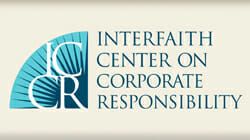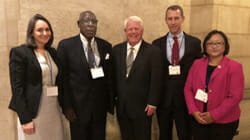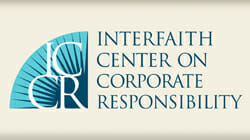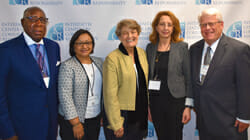ABHMS continues five-decade commitment to socially responsible investing
A founding member of the Interfaith Center on Corporate Responsibility (ICCR), American Baptist Home Mission Societies (ABHMS) supported its annual event “Taking a Stand: Corporate Action to Protect Human Rights Defenders” last month. Dave Moore Jr., director of investments, represented ABHMS at the New York City event at the Redeemer Presbyterian Church West Side. ABHMS has continued its commitment to socially responsible investing for close to five decades.
ICCR board chair the Rev. Seamus Finn, Missionary Oblates of Mary Immaculate, noted the organization will mark its 50th anniversary in 2021: “Inspired by faith and committed to action continues to be the guideposts for much of the work that we do.”
The annual event’s featured panel discussion was moderated by Chris Jochnick, chief executive officer of Landesa Rural Development Institute. A global land rights expert, he previously worked on business and development for Oxfam America. He co-founded the nonprofit Center for Economic and Social Rights and Centros De Derechos Economicos y Sociales.
Panelists were Bennett Freeman, a board member for the Institute for Human Rights and Business and lead author of the Business and Human Rights Center’s “Shared Space Under Pressure: Business Support for Civic Freedoms and Human Rights Defenders;” Nicole Karlebach, global head of Business and Human Rights for Oath: A Verizon Company, former head of Yahoo Business and Human Rights Program, and a former human rights consultant to the UN Office of the High Commissioner for Human Rights; and Ines Osman, a human rights lawyer and co-founder and director of MENA Rights Group, a nongovernmental organization that seeks to protect human rights in the Middle East and North Africa via litigation.
Jochnick began the discussion by asking panelists to help the audience to understand the concept of civic freedoms, civil rights defenders and who is impacted.
Freeman responded by pointing to the 1995 executions of the Ogoni Nine, activists who opposed both the Nigerian military dictatorship and the operating practices of Royal Dutch Shell. Noting that Shell faced criticism that continues to resonate today, he rhetorically asked how Shell could have averted the killings.
“What to do and how to do it remain unresolved, but we’re in a different era of geopolitical disruption,” he said. “We’re in an age of impunity. Civic freedoms are under attack. Human rights defenders are being assassinated left and right.”
Stressing that the issue transcends Shell, he said that extractives, agriculture, apparel and technology are the four biggest sectors faced with human rights challenges and the opportunity to prevent them.
“We’re in a dire emergency situation around the world with civil society and human rights defenders getting pounded and getting killed,” Freeman said. “This is the time for civil society to speak up.”
Osman noted that human rights-related challenges in the Middle East tend to be related to the technology sector. Because freedoms are repressed by oppressive governments, she explained, people turn to online platforms. However, digital rights have been increasingly repressed, and it’s difficult to determine who is being targeted by cyber surveillance. This phenomenon has led to human rights defenders fearing to communicate with Osman’s organization.
Osman says, “People say, ‘They might be spying on me, and I don’t want to be arrested.’”
Jochnick asked Karlebach how Verizon would handle a situation in which ICCR or other activists would ask for a specific statement about a human rights defender being jailed. She replied that Verizon is set up to work with public policy teams around the world.
“We need to be thinking strategically about where our voice would be most beneficial or not,” Karlebach said. “We don’t want to do more harm than good in these situations.”
When asked by an audience member whether some countries are so egregious with human rights abuses that companies should avoid doing business with and within them, Osman pointed to Saudi Arabia. She said that companies should boycott the recent three-day Saudi Future Investment Initiative—also known as “Davos in the Desert”—as they did last year following the murder of journalist Jamal Khashoggi.
Osman noted that automobile companies have contributed to what she called the “shiny new image of Saudi Arabia” that resulted from the lifting of the ban on women driving. Because 3 million new drivers are expected in Saudi Arabia by next year, she said, automobile companies naturally want to advertise there. Osman reminded the audience, however, that a 30-year-old human rights defender remains in prison and was waterboarded for advocating for the lifting of the ban on women driving.
Freeman concluded the panel discussion with this comment: “The age of impunity puts more responsibility on businesses—particularly large multinationals.”
Information about ABHMS’ commitment to socially responsible investing is available online.






